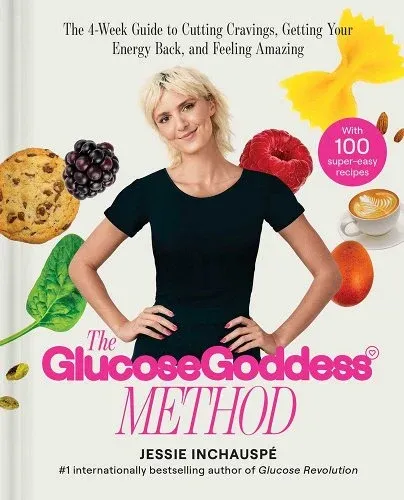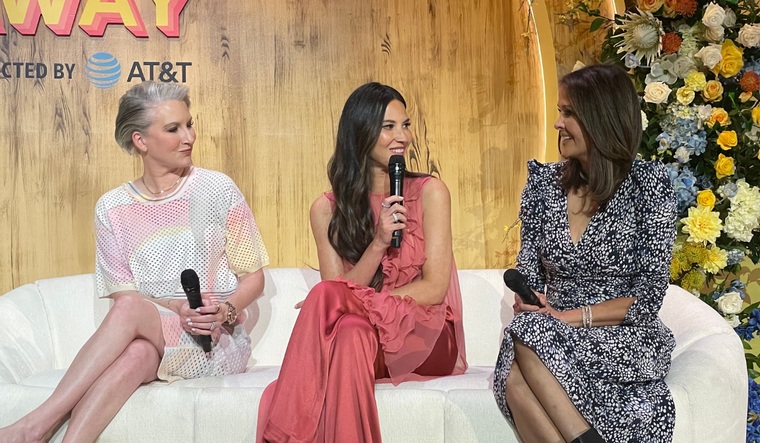Want to Be More In Control of Your Health and Reverse Disease? The Glucose Goddess Has Simple Hacks That'll Set You on Your Path ASAP
For a long time, most of us thought about blood glucose in the context of diabetes. These days, we hear terms like glucose, blood sugar, insulin resistance, and metabolic health a lot more frequently, and more of us realize that lots of spikes and dips in our blood glucose lead to both short- and long-term health problems.
French biochemist Jessie Inchauspé—known as the Glucose Goddess on Instagram and author of the new book, The Glucose Goddess Method—is thrilled that glucose is having a moment in the spotlight. She’s convinced each of us can live a healthier, happier life simply by balancing our blood sugar, and she can point to the science to prove it.
“Glucose spikes trigger a wide range of symptoms and conditions, everything from sugar cravings and chronic fatigue to brain fog, psoriasis, and so many more health conditions,” says Inchauspé. “I believe these symptoms are our bodies speaking to us, trying to tell us about the glucose roller coaster we’re on.”
So, how do we get off the blood glucose roller coaster to feel better and get healthier? We asked Inchauspé to share some of the science-backed hacks in her new book, as well as why they’re so powerful when it comes to setting anyone on a path to better health—starting now.
A CONVERSATION WITH JESSIE INCHAUSPÉ
OK, can we start with what glucose is, exactly, for those of us who need a refresher?
Yes! Glucose is our body’s preferred source of energy. Every cell in our body uses glucose to perform its function: our lung cells use glucose to breathe, our brains use it to think, our heart uses it to pump blood, and so on. The main way we provide our bodies with glucose is by eating it, and it’s found mostly in carbohydrates and sugary foods.
However, when we get too much glucose too quickly after we eat, we experience what’s called a glucose spike. After the glucose high, we experience a drastic drop in glucose. This glucose roller coaster happens to all of us—not just those with diabetes! In the last five or so years, scientists started noticing that even if you don’t have pre-diabetes or diabetes, you can get these glucose spikes and dips, which come along with symptoms. You might think you’re just somebody who gets really hangry or craves junk food, or you’re simply one of those people who’s tired all the time. However, the science is clear that these symptoms and many others may actually be a result of dysregulated glucose.
Instead of seeing those symptoms as something to suppress, what if you saw them as your body trying to speak to you?
A lot of people think the only way to avoid glucose spikes is to cut out all carbohydrates. But you argue this isn’t necessary, right?
One way to avoid glucose spikes is to cut out all carbs, yes. But that’s no fun! And it’s not sustainable. When I looked at the science, I realized you can still eat starches and sugars you love, with a lot less impact on your glucose, by incorporating a few habits into your days. These habits will help you manage your body and your health while eating everything you love.
I like to imagine them as gentle giants. By placing these habits throughout your day, your glucose will be more steady, which means your glucose spikes won’t be so high, and your glucose dips won’t be so low. And you’ll notice your symptoms will start to subside.
Your new book focuses on the four “gentle giants” or hacks that are most important to start with when it comes to regulating blood sugar. Can you explain what these are, and how they work?
Hack No. 1: Have a savory breakfast. The right kind of breakfast is a non-negotiable for steady glucose. If you have a sweet and carbohydrate-heavy meal that spikes your glucose first thing, it’ll negatively impact the rest of your day. A savory breakfast is built around protein, with only a little fruit as a sweet for taste.
Hack No. 2: Have one tablespoon of vinegar a day, 10 minutes before the meal that’ll be the highest in glucose. Vinegar will significantly reduce the glucose spike of sweet or starchy foods because it contains a powerful component called acetic acid, which slows down the rate at which our digestive enzymes break down sugars and starches into glucose. Acetic acid also gets into the bloodstream and actually penetrates our muscles, where it encourages those muscles to soak up glucose molecules that are floating around and store them for our next bout of movement.
Hack No. 3: Add a veggie starter to one meal a day. When you eat fiber-rich veggies at the beginning of a meal, that fiber arrives in our upper intestine before the other foods and forms a protective mesh that stays in place for a few hours. This mesh reduces the absorption of glucose molecules that make their way through our digestive system during the rest of the meal, which slows them down and reduces the glucose spike of the meal.
Hack No. 4: After you eat, move your body. Remember, every cell in your body likes to use glucose for energy. Your muscles are the same, and the first place muscles look for energy is glucose in your bloodstream. So, if you move after eating, some of the glucose you just ate gets used up by your muscle cells, and the glucose spike will be less. Movement can look like cleaning your kitchen, dancing to songs, doing a few calf raises at your desk, or going to the gym and doing something intense. Any movement will impact your glucose for the better.
Are there any glucose hacks that still surprise you? Anything you do to prevent spikes in glucose that you cannot believe work as well as they do?
Honestly, the power of having a savory breakfast is the one that still surprises me the most. I grew up [in France] eating a Nutella crepe every morning. I just thought it was normal that by 11 a.m., I was exhausted and so hungry my stomach was in pain. For me, this shift from a sweet to savory breakfast completely shifted my life. I’m a different person.
Your new book is filled with healthy, blood sugar stabilizing recipes. What’s your advice for readers who hate cooking?
I created this book specifically for people who’ve never followed a recipe before. Most of the recipes I’ve included are more about assembling, not cooking. I really wanted it to feel like I came into your kitchen to show you how to throw some foods together to make a delicious meal that won’t spike your glucose.
The best part about your hacks is that they don’t require restrictive diets or expensive supplements. What do you want people to know about your methods?
These principles have been cultural habits around the world for a very long time. In many countries, savory breakfasts are standard. In the Mediterranean, veggies always come first. This isn’t a diet book! These methods will help you remember this ancestral wisdom, and I literally point you to all the science proving how they work.
I’ve seen firsthand how these methods worked on me. This energy and passion came through, and I thought: People need to know this. My hope is that by translating the scientific papers in a way that makes people want to change their behavior, they will.

Jessie Inchauspé is a French biochemist and author. She is on a mission to translate cutting-edge science into easy tips to help people improve their physical and mental health. In her first book, Glucose Revolution, a #1 international bestseller translated into forty-one languages, she shared her startling discovery about the essential role of blood sugar in every aspect of our lives, and the surprising hacks to optimize it. Jessie is the founder of the wildly popular Instagram account @GlucoseGoddess, where she teaches over one million people about transformative food habits. She holds a BSc in mathematics from King's College, London, and an MSc in biochemistry from Georgetown University.
Question from the Editor: Do you think about how certain foods or habits will impact your blood sugar? Will you try some of Jessie Inchauspé’s science-backed hacks?
Please note that we may receive affiliate commissions from the sales of linked products.




